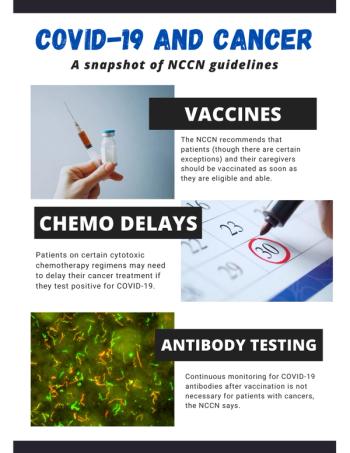
Lifileucel produced durable responses in advanced melanoma that was previously treated an an immunotherapy agent.

Lifileucel produced durable responses in advanced melanoma that was previously treated an an immunotherapy agent.

Caregivers have their own set of issues and anxieties, but a telehealth support service may help.

The information provided by the assessment is essential as it contributes to shared decision making. The goal of shared decision-making is for patients and clinicians to partner together and make informed choices based on the patient’s needs, values and preferences.

The FDA granted a regular approval to sacituzumab govitecan (Trodelvy) for previously treated patients with unresectable locally advanced or metastatic triple-negative breast cancer.

Wearable fitness trackers may boost fitness, quality of life and overall health in childhood cancer survivors.

The FDA has approved a new biweekly dosing regimen of 500 mg/m2 as a 120-minute intravenous infusion for cetuximab (Erbitux) for patients with KRAS wild-type, EGFR-expressing colorectal cancer or squamous cell carcinoma of the head and neck.

Patient-reported outcomes (PRO) hold valuable information on how patients are handling cancer treatment. Recent research analyzed which methods of PROs patients prefer.

Mehrdad Abedi, MD, discusses the challenges of standard transplant, how Orca-T could overcome some of those limitations, and the potential future of transplant in hematologic malignancies.

The National Comprehensive Cancer Network has updated its Clinical Practice Guidelines to include tivozanib as a recommended regimen for subsequent therapy in patients with clear cell renal cell carcinoma.

The FDA has granted a breakthrough therapy designation to the FGFR inhibitor futibatinib for the treatment of patients with previously treated, locally advanced or metastatic cholangiocarcinoma that harbors FGFR2 gene rearrangements, including fusions.

Each month, we take a look back at the most popular Oncology Nursing News® stories. Here are the top 5 stories from March 2021.

A biologics license application has been submitted to the FDA for the approval of F-627 as a treatment option for patients with breast cancer who have chemotherapy-induced neutropenia.

The FDA has approved isatuximab in combination with carfilzomib and dexamethasone for the treatment of adult patients with relapsed or refractory multiple myeloma who have previously received 1 to 3 lines of therapy.

The FDA has granted a fast track designation for annamycin as a treatment for patients with soft tissue sarcoma lung metastases.

The FDA has approved a revised label for daunorubicin/cytarabine (Vyxeos) to include the treatment of pediatric patients aged 1 year and older with newly diagnosed, therapy-related acute myeloid leukemia (AML) or AML with myelodysplasia-related changes.

Ahead of the Prescription Drug User Fee Act action date for the application, the regulatory agency’s Oncologic Drugs Advisory Committee voted 10 to 0 that a decision be deferred until further findings from KEYNOTE-522 trial become available.

While there have been advancements in palliative care programs and clinician education, more still needs to be done, one expert says.

The FDA has approved idecabtagene vicleucel as the first BCMA-directed CAR T-cell therapy for patients with relapsed/refractory multiple myeloma after 4 or more prior lines of therapy, including an immunomodulatory agent, a proteasome inhibitor, and an anti-CD38 monoclonal antibody.

The FDA has granted 2 breakthrough device designations to cover new intended uses of the Signatera molecular residual disease (MRD) test.

A recent study found that cultural awareness among nurses is not enough. Clinicians need more training and resources to improve cancer care for patients with limited English proficiency.

We want to hear from you: what is the limiting factor in managing adverse events in patients with cancer?

The FDA has approved pembrolizumab for use in combination with platinum and fluoropyrimidine-based chemotherapy for patients with metastatic or locally advanced esophageal or gastroesophageal carcinoma who are ineligible for surgical resection or definitive chemoradiation.

Sleep is key to optimal health, and bright white light therapy may help adolescent cancer survivors improve their circadian rhythms.

The real-world utilization of axicabtagene ciloleucel demonstrated favorable outcomes and less frequent toxicity events compared with those reported in the pivotal ZUMA-1 trial and other real-world studies.

The FDA has approved TheraSphere™ Yttrium-90 Glass Microsphere for the treatment of patients with hepatocellular carcinoma.

Here are the key points to know about the National Comprehensive Cancer Network’s guidelines on treating cancer during the COVID-19 pandemic.

Although cancer screening rates and ensuing diagnoses dropped significantly during the height of the COVID-19 pandemic, testing rates from June 2020 through September 2020 have nearly returned to pre-pandemic levels.

The FDA has granted priority review to the new drug application for the HIF-2α inhibitor belzutifan for the potential treatment of patients with von Hippel-Lindau–associated renal cell carcinoma that does not require immediate surgery.

As more Americans get vaccinated against COVID-19, new questions arise, such as: how often should cancer survivors who have been vaccinated against the disease be tested for antibodies?

In this episode of “The Vitals,” an oncology nurse practitioner and certified yoga instructor discusses simple mindfulness strategies that can improve resiliency, leading to fewer feelings of clinician burnout.